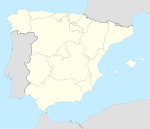Masueco
| Masueco municipality | ||
|---|---|---|
 Masueco - the village with a vineyard
|
||
| coat of arms | Map of Spain | |

|
|
|
| Basic data | ||
| Autonomous Community : | Castile and Leon | |
| Province : | Salamanca | |
| Comarca : | La Ribera | |
| Coordinates | 41 ° 12 ′ N , 6 ° 35 ′ W | |
| Height : | 684 msnm | |
| Area : | 19.76 km² | |
| Residents : | 272 (Jan. 1, 2019) | |
| Population density : | 13.77 inhabitants / km² | |
| Postal code : | 37251 | |
| Municipality number ( INE ): | 37184 | |
| administration | ||
| Website : | www.masueco.com/web/ | |
Masueco (or Masueco de la Ribera ) is a municipality ( municipio ) in northern Spain in the province of Salamanca in the autonomous community of Castile and León .
location
Masueco is located in the northwest of the province of Salamanca at an altitude of approx. 690 meters above sea level. d. M. in the rocky landscape of the Arribes del Duero Natural Park . The Río Uces flows east of the place about two kilometers away; in places it forms the border with the neighboring communities of Cabeza del Caballo , La Peña and Pereña de la Ribera . The provincial capital Salamanca is about 97 kilometers (driving distance) in a southeast direction.
Population development
| year | 1950 | 1960 | 1970 | 1981 | 1991 | 2000 | 2018 |
| Residents | 1043 | 1091 | 811 | 622 | 510 | 473 | 289 |
In the first half of the 20th century the town had a constant population of around 1000. As a result of job losses due to the mechanization of agriculture , the population has since fallen to its current low.
economy
The agriculture (field economy, viticulture and livestock) has traditionally played the biggest role in the economy of the community. Income from tourism in the form of renting out holiday homes ( casas rurales ) has increased over the last few decades.
history
After the largely bloodless recapture ( reconquista ) and resettlement ( repoblación ) of the almost deserted mountain region from the hands of the Moors in the 11th and 12th centuries, the region initially belonged to the dominion of the Leonese and Castilian kings. However, the latter transferred it to the custody of individual landlords ( señores ) around 1300 , who from then on had to deal with isolated attacks by Portuguese rulers.
Attractions
- The parish church ( Iglesia de San Nicolás de Bari ) dates from the 15th century; the transverse bell tower was added in the 16th century. Inside, between the tower and the church, you can see a clear crack in the wall, which is said to have occurred during the Lisbon earthquake (1755). The church was built by the Lanestosa family of architects, whose members also created the churches in the neighboring towns of Vitigudino , Vilvestre , Pereña , Saucelle and Aldeadávila .
- There are four hermit churches in the municipality; the Ermita del Santo Cristo del Humilladero has a spacious column-supported vestibule ( portico or atrio ).
- The main attraction in the vicinity of the place is the waterfall Pozo de los Humos . The Río Uces falls here - especially during the winter rainfalls in January to March or after the rare but violent thunderstorms in summer and autumn - about 45 meters deep.
- There are still a few stone huts in the wooded area .
Web links
- Masueco - Photos + Info (Spanish)
- Río Uces and Pozo de los Humos - photos
- Pozo de los Homos - Photos
Individual evidence
- ↑ Cifras oficiales de población resultantes de la revisión del Padrón municipal a 1 de enero . Population statistics from the Instituto Nacional de Estadística (population update).

